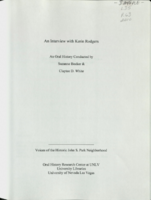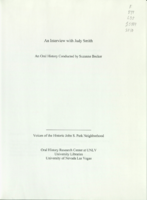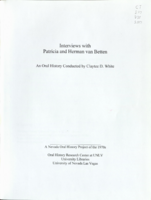Search the Special Collections and Archives Portal
Search Results

Mauricia Baca interview, December 16, 2019: transcript
Date
Archival Collection
Description
Interviewed by Elsa Lopez and Claytee White. Mauricia Baca, Director of Get Outdoors Nevada, was born to a Jewish American mother and Mexican father who settled in New York City. She overcame the economic obstacles of her early life to graduate from Vassar College and University of New York Law School, where she learned to be proud of her identity. Subjects: Jewish, Education, Law School, Latinx, Mexican
Text

Transcript of interview with Flo Mlynarczyk by Claytee White, July 7, 2005
Date
Archival Collection
Description
Flo Mlynarczyk began life in Fort Morgan, Colorado. Her parents divorced and she moved with her mother first to Loveland and eventually to Los Angeles. Her mother started the first Red Cross in Bell Gardens, oversaw the building of their home, and raised money for various charities. Flo remembers when the Japanese were rounded up and interred during WWII. She was in grade school and recalls that one day they all just disappeared. Upon graduation from high school in 1943, Flo moved to Kodiak, Alaska, to live with friends. She recalls total blackouts on the streets of Kodiak due to the war, the Short Snorter Club, and her return to California after a bout of pneumonia. Back in Bell Gardens, Flo worked for a department store, married and divorced in 1945, gave birth to her son Michael in 1946, and ended up in Tonopah, Nevada, with a sister who ran a cafe there. After a second marriage ended, Flo moved to Las Vegas and began working at Phelps Pump and Equipment as a bookkeeper.
Text

Transcript of interview with Kerin Scianna Rodgers by Suzanne Becker and Claytee D. White, February 7, 2009 and August 11 & 16, 2011
Date
Archival Collection
Description
Kerin Rodgers was born in 1936. She recounts her family history and stories of her youth growing up in Boston, MA, and shares how the family relocated to Seattle, WA in the mid-1940s. She talks about her enjoyment of theatrical arts and politics, and about being a resourceful divorced, single-mom and entrepreneur. In 1958 she opened a retail fashion store and modeling agency with a friend in Santa Monica, CA. Kerin had a knack for fashion and interior design that would assist her then and into the future. She also shares the story of arriving in Las Vegas as part of retail job with The Broadway stores in 1966—a two-week stint that seemed to have no ending. Her transition into Las Vegas included remarriage, a 1974 Keno win that enabled her to put down money on a home ( a house built by Paul Huffey) in the John S. Park neighborhood, and making close friends in the community. Her interview is sprinkled with tales of activities and personalities from the neighborhood's past and present. Kerin was involved with the Focus Youth House, speaks about First Fridays and art, as well as gives a perspective of police, criminal behaviors and changes in the neighborhood over the years. She hosted a local television show and enjoyed being a community activist.
Text

Transcript of interview with Judy Smith by Suzanne Becker, November 22, 2008
Date
Archival Collection
Description
Judy Smith was a teenager when her family relocated from Barstow, CA to Las Vegas in 1958. It was a wide open setting, an ideal location for riding her horse. It was also an era of growth as the city became a gambling destination and the Strip became dotted with early casinos and hotels. Judy attended Las Vegas High School, worked for the Las Vegas Sun and earned a scholarship to UNR. By 1967, she was married and moving back to Vegas with her young family. They chose the John S. Park Neighborhood as the place to call home. For Judy living in John S. Park is about a "sense of place" and "a sense of timelessness." She describer the evolution of the neighborhood and the greater Las Vegas community from the pioneers to the contemporary leaders. In 2006, Judy's home was gutted by a fire. Her life was saved by an observant neighbor. She could have relocated at the time, but chose not to move from the area that she has called home for over 40 years.
Text

Transcript of interview with Pat van Betten by Claytee White, February 6, 2007
Date
Archival Collection
Description
Patricia and Herman van Betten met in Pittsburg through their volunteer work on the John F. Kennedy Campaign. After their Connecticut wedding and Herman's studies at the University of Texas and the University of Southern California, they and three small children moved to Las Vegas. Their fourth child, a native Las Vegan, was born in 1968. In 1967, Herman acquired a position at the Nevada Southern University, which is now the University of Nevada, Las Vegas. Beginning in the 1970's the couple worked diligently to make the Las Vegas community a great place to live. They participated in The League of Women Voters, The Consumer League, the Welfare Rights Movement, and the Community of a Hundred. Patricia served as the President of the Consumer League and Herman was elected to the local school board. They were jointly appointed by the ACLU as Civil Librarians of the Year, 1990-1991. Currently retired, they engage in civic, environmental, and historical activism in the village of
Text

Gene Leavitt interview, February 28, 1979: transcript
Date
Archival Collection
Description
On February 28, 1979, collector Monte Leavitt interviewed Gene Leavitt (born October 6th, 1923 in Mesquite, Nevada) at his home in North Las Vegas, Nevada. In this interview, Mr. Leavitt talks about his career as a truck and bus driver. He also talks about the life in Southern Nevada, the soldiers stationed here, and gambling.
Text

Transcript of interview with Bruce Woodbury by Claytee White, February 25, 2009
Date
Archival Collection
Description
When Bruce Woodbury, native Las Vegan, attorney, and former county commissioner, looks back on growing up, he immediately says: My first memory of a house here in Las Vegas was in the John S. Park area. The Woodbuiy family lived in two houses in the neighborhood and attended only two schools, John S. Park Elementaiy and Las Vegas High School. Bruce's recollections begin in the 1940s, when they lived on the edge of town. Bruce has what he calls a "nostalgic yearning for the old Las Vegas, even though today it's an exciting, vibrant community in many ways." And during this oral history interview, he recalls the safe feeling of the times—unlocked doors and children allowed to roam more freely than today. The Strip was a "separate world" where kids like himself might go to a show occasionally with their parents, celebrate a prom dance or, as he did, get a part-time job. One of Bruce's jobs included being a busboy at the Flamingo Hotel & Casino where he confesses to learning and
Text

Chester Hodson interview, March 4, 1981: transcript
Date
Archival Collection
Description
On March 4, 1981, collector Marlene L. Larson interviewed Chester Albert Hodson, Jr. (born December 21st, 1948 in Las Vegas, Nevada) at the Sizzler restaurant in Las Vegas, Nevada. In this interview, Mr. Hodson speaks about working in the restaurant industry in Las Vegas, as well as his father’s experience working in the industry. He also talks about living in Las Vegas and the changes he has seen throughout his life.
Text

Louis Richardson interview, July 29, 2016: transcript
Date
Archival Collection
Description
As a youth, contractor Louis Richardson followed opportunities that would take him across the U.S. and to Sierra Leone, Africa. Originally from Charleston, South Carolina, Richardson attend Hampton Institute, in Hampton, Virginia, a historically black college/university (HBCU); there, he majored in construction and engineering and joined the Reserve Officers' Training Corps (ROTC). After graduation and U.S. Army service in Vietnam, he received an offer from U.S. State Department to teach young adults math and construction in West Africa. That experience led him to work for various Housing Authorities in New Jersey, Los Angeles, and finally, in 1978, to Las Vegas. In this interview, Richardson talks about how his early experiences shaped his vision of the types of projects he would undertake. He speaks about his focus on engineering how he came to Las Vegas and of the public works projects in schools, parks, and libraries that came to define his body of work. He explains the bid proces
Text

Transcript of interview with Ernest Clary by Tom Mattingly, February 10, 1979
Date
Archival Collection
Description
On February 10, 1979, collector Tom Mattingly interviewed his neighbor, professional engineer geologist and registered surveyor, Ernest Henry Clary (born May 21st, 1906 in Lincoln, Nebraska) in the collector’s home in Las Vegas, Nevada. The interview covers Mr. Clary’s personal and professional life and the history of Nevada, including, the early above-ground atomic tests, presidential visits and the crash of Carole Lombard’s plane. All persons present during the interview, include: Tom Mattingly, Ernest Clary, Mary Mattingly, and Matt Mattingly.
Text
